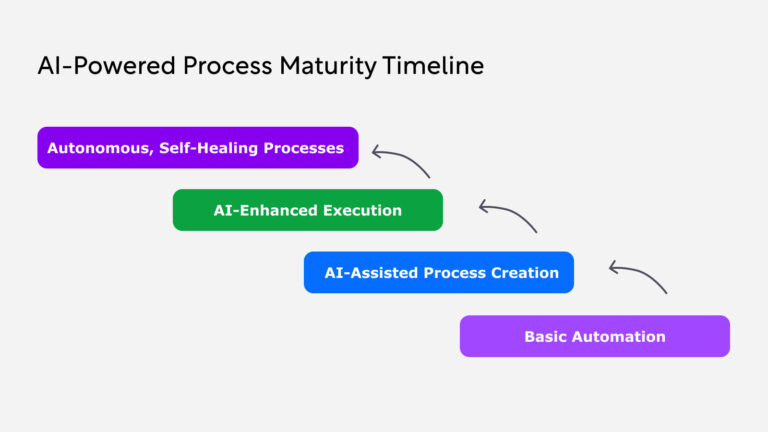Artificial Intelligence (AI) is the driving force behind the next generation of business process management (BPM). Organizations across industries are using AI not only to design and create processes faster but also to execute them with greater precision and efficiency. By combining intelligent automation with human insight, enterprises can unlock agility, cost savings, and competitive advantage.
AI in Process Creation
Traditionally, process creation required lengthy discovery workshops, manual mapping, and repeated iterations. Today, AI accelerates this journey by:
- Natural Language Process Design: Business users can describe a workflow in plain language, and AI automatically generates a process model. This removes the barrier between technical and non-technical stakeholders.
- Process Mining and Discovery: AI analyzes event logs and identifies process inefficiencies, suggesting improvements or even creating entirely new workflows.
- Smart Recommendations: Machine learning models suggest best practices, templates, and compliance checks during process creation, reducing design errors from the start.
AI in Process Execution
Process execution is where business value is truly realized. AI enhances execution by:
- Dynamic Decision-Making: AI agents evaluate data in real time, enabling workflows to branch intelligently without human intervention.
- Predictive Task Assignment: Machine learning assigns tasks to the right users based on workload, skills, and historical performance, improving throughput.
- Intelligent Automation: AI integrates with robotic process automation (RPA) and APIs to handle repetitive tasks while humans focus on strategic activities.
- Continuous Optimization: As processes run, AI monitors KPIs and identifies bottlenecks, providing recommendations for immediate adjustment.
Business Impact of AI in Process Creation & Execution
Enterprises adopting AI in BPM are seeing measurable benefits:
- Faster time-to-value: Processes are designed and deployed in days, not months.
- Cost reduction: By automating decision points and repetitive work, organizations cut operational costs.
- Improved compliance: AI ensures regulatory requirements are embedded during both design and execution.
- Enhanced customer experience: Faster, smarter workflows mean quicker resolutions and improved satisfaction.
The Future: Autonomous Processes
We are moving toward self-healing, autonomous processes where AI detects issues, reconfigures workflows, and executes corrective actions without human involvement. This evolution redefines the role of process managers, who shift from day-to-day troubleshooting to strategic innovation and oversight.
Conclusion
AI in process creation and execution is more than just a technology trend; it’s the foundation for digital transformation. By embracing AI, organizations empower teams to design smarter processes, execute them seamlessly, and continuously improve for long-term success.
Ready to experience the power of AI-driven process automation? Request a demo today and see how ProcessMaker can transform the way your business operates.
Read more on AI and Agentic AI:
Whitepaper: Agentic AI at ProcessMaker
Agentic AI in Process Automation
Organizational Readiness for Agentic AI
Ethical Considerations of Agentic AI
Barriers to AI Adoption in Business Process Automation
Making AI Inclusive for Non-Technical Teams
Unlocking the Full Potential of AI: Why Task Mining is Your Secret Weapon
The Perfect Partnership of BPA and AI
The Rise of AI Whisperers: Bridging the Gap Between AI and Business
Use cases:
5 Ways Agentic AI Transforms Employee Experiences
Automation in Investment Analysis: How Agentic AI is Transforming the Industry


